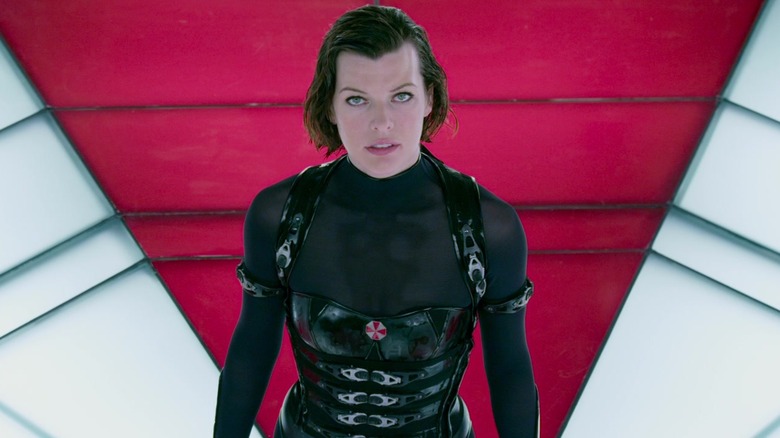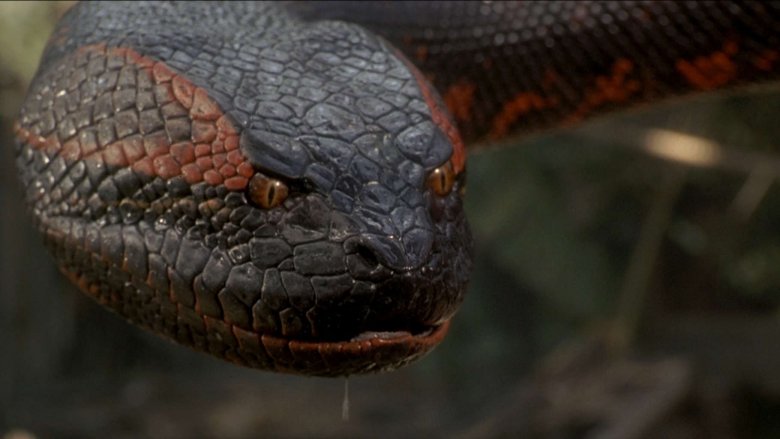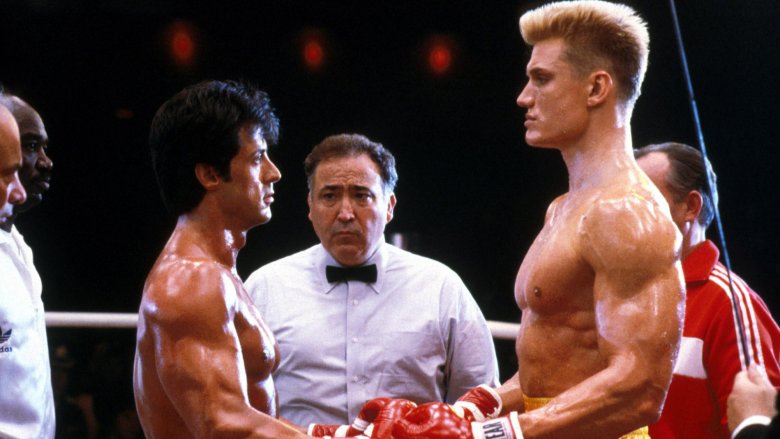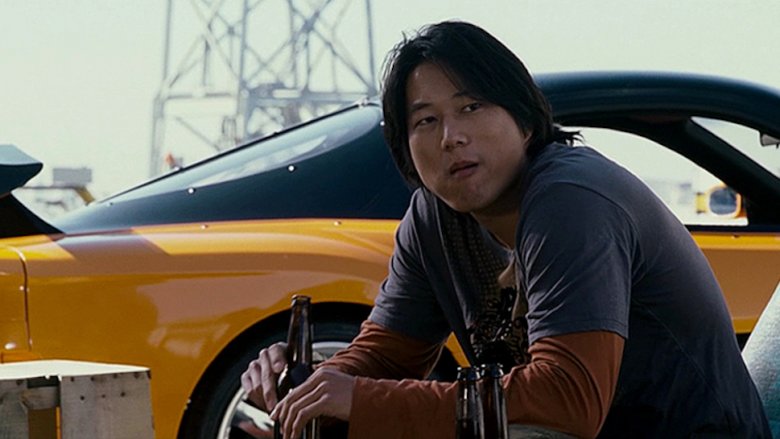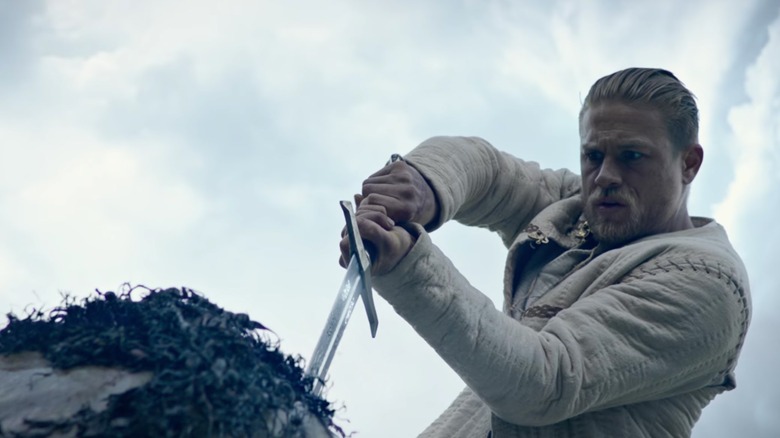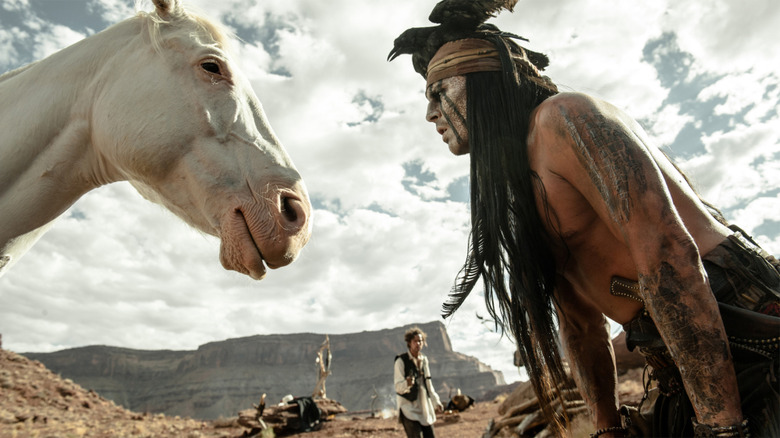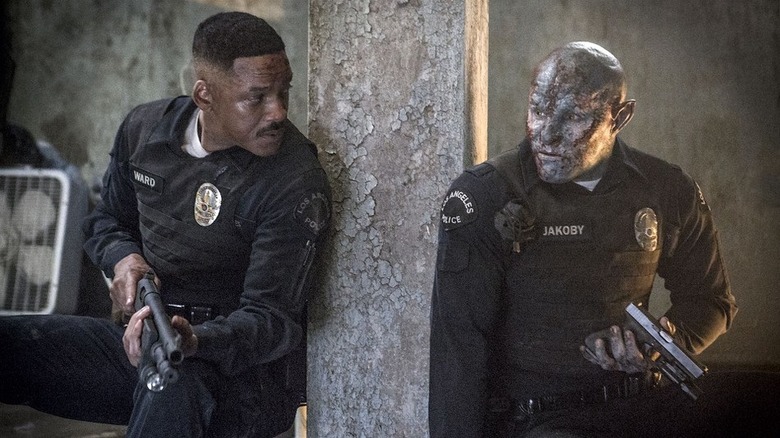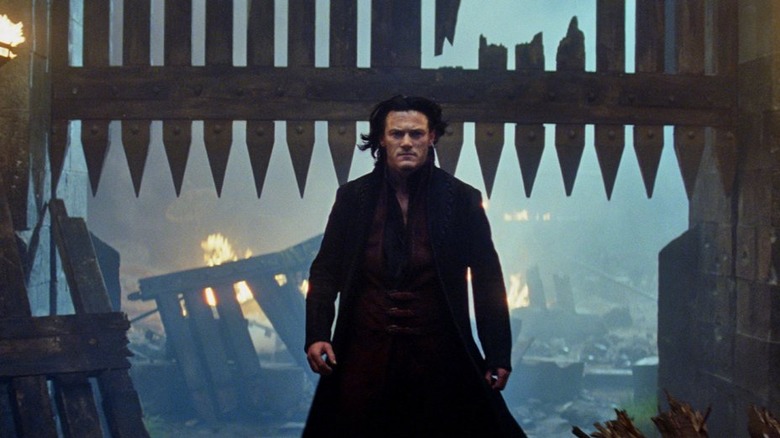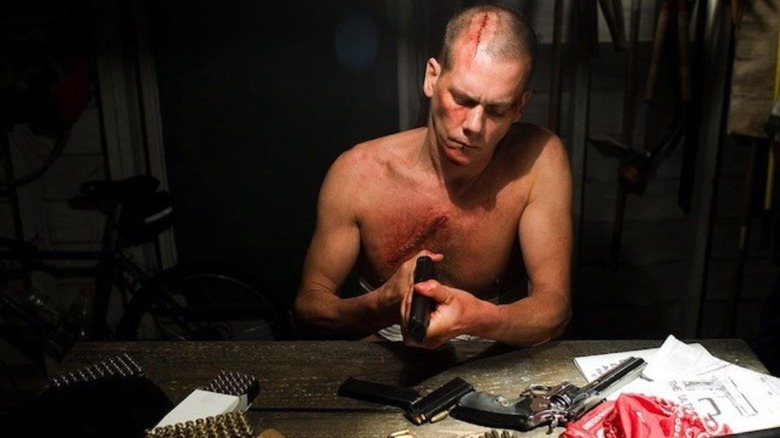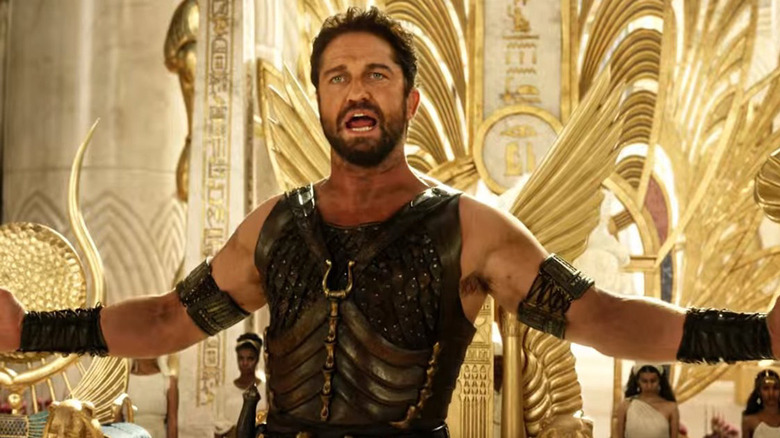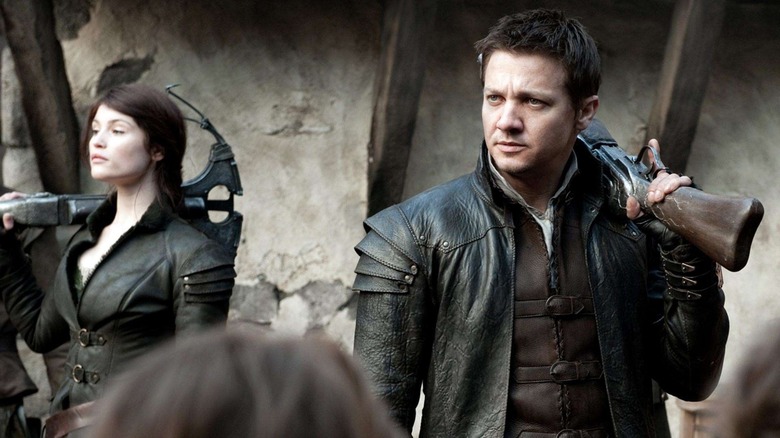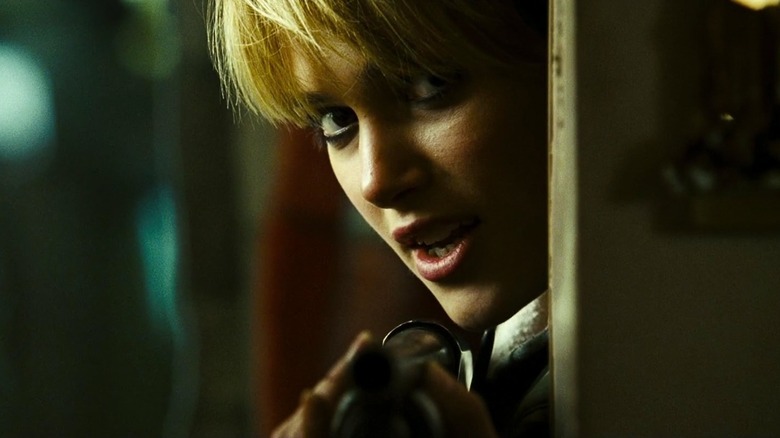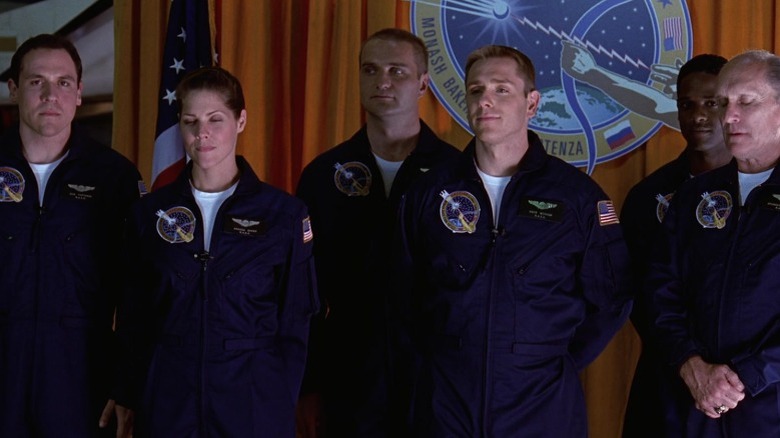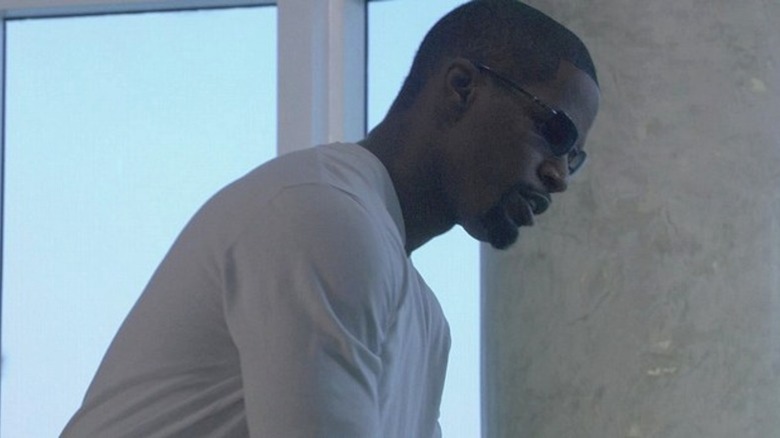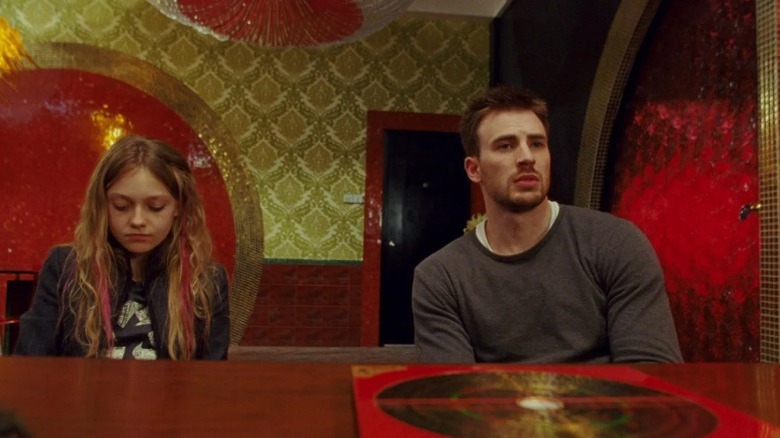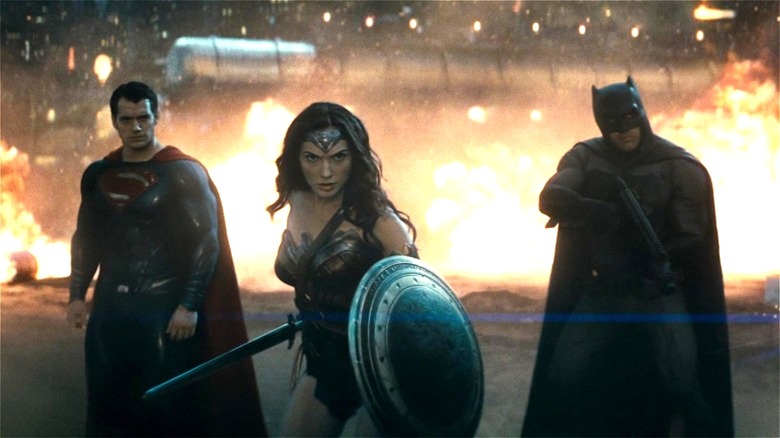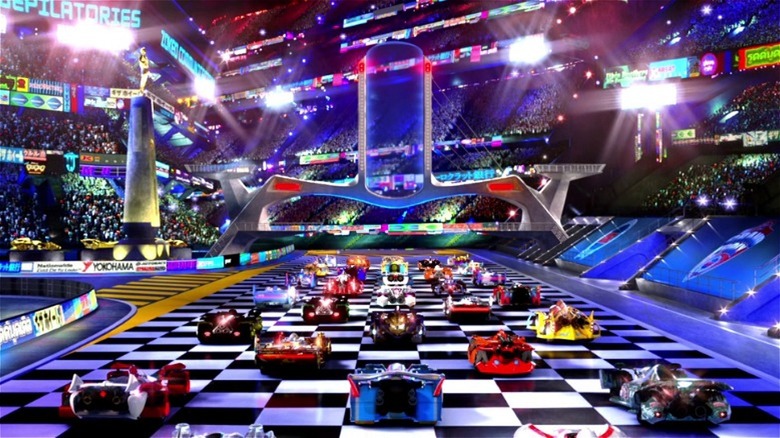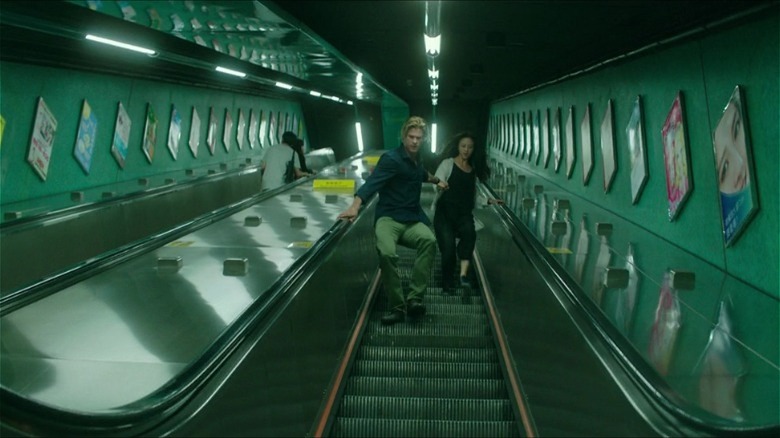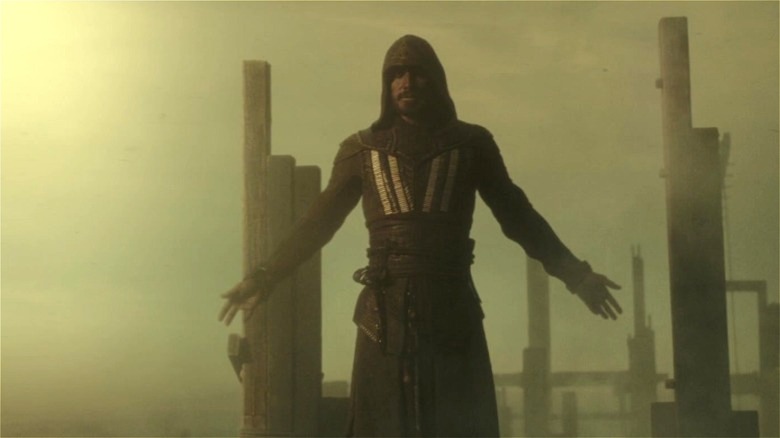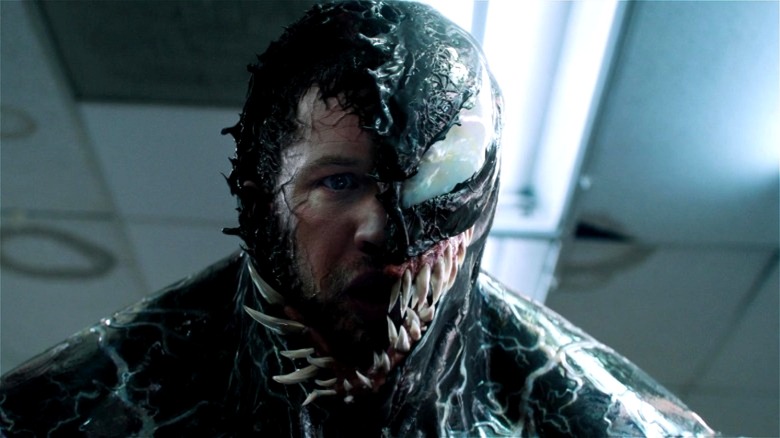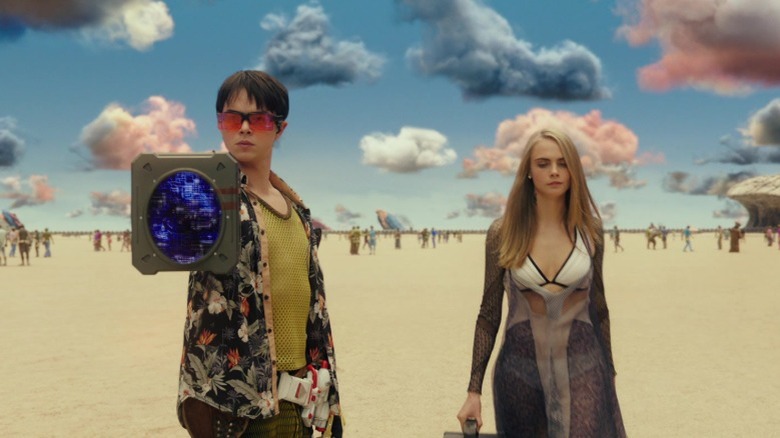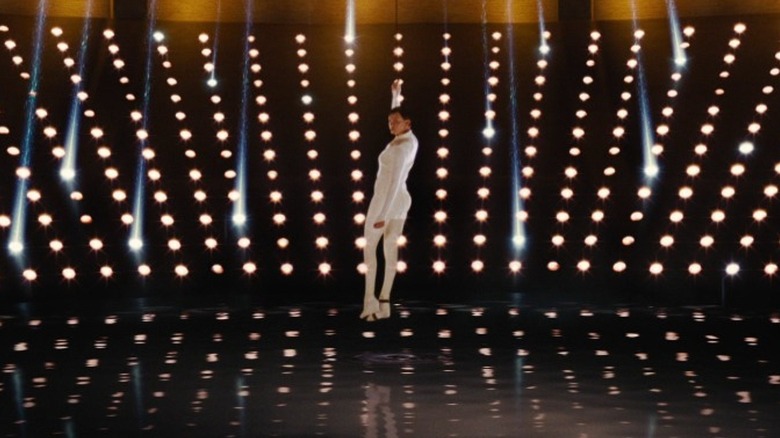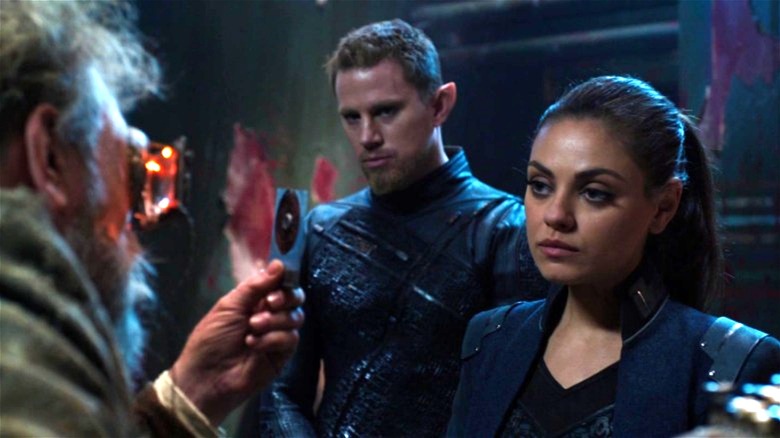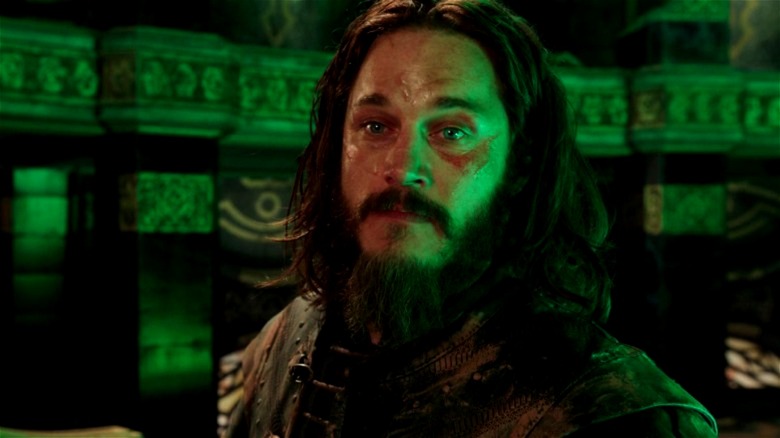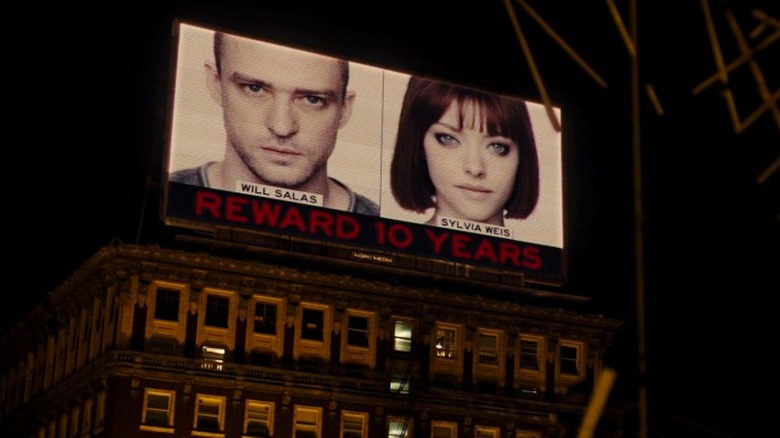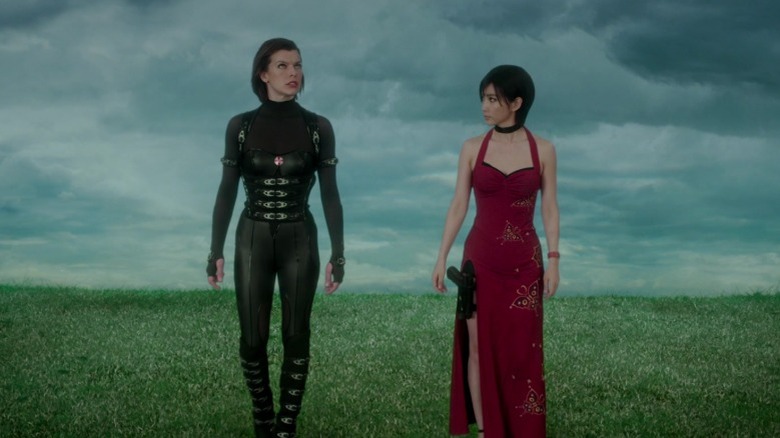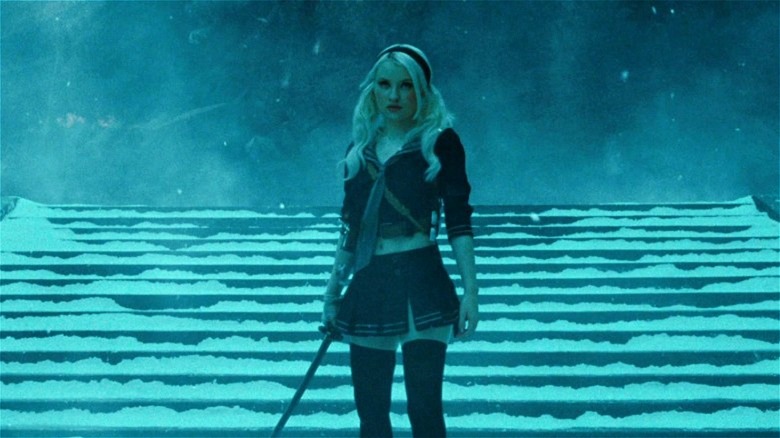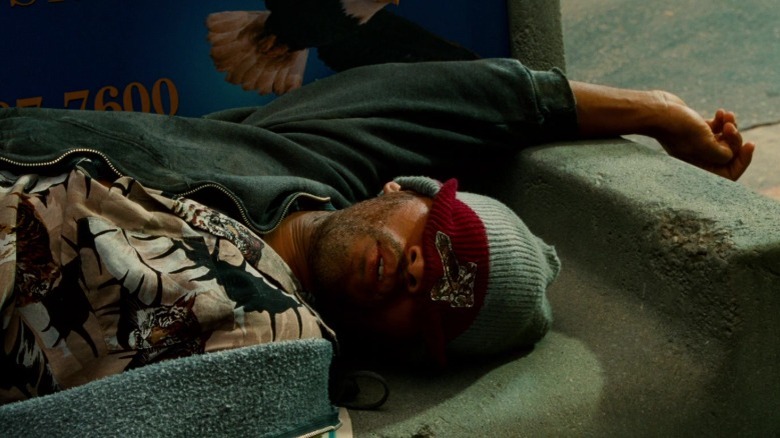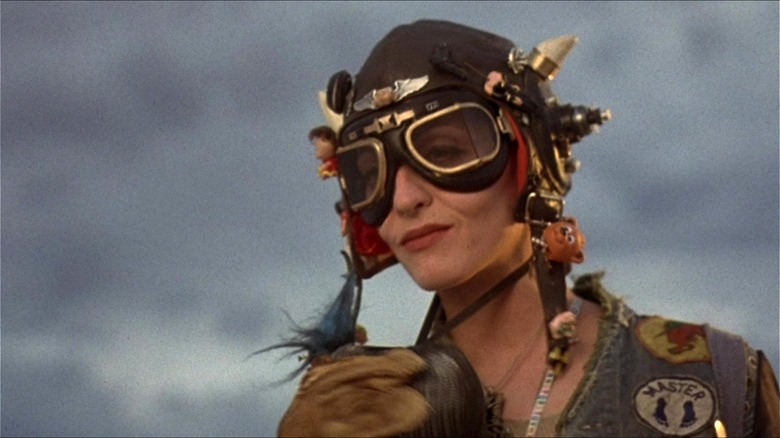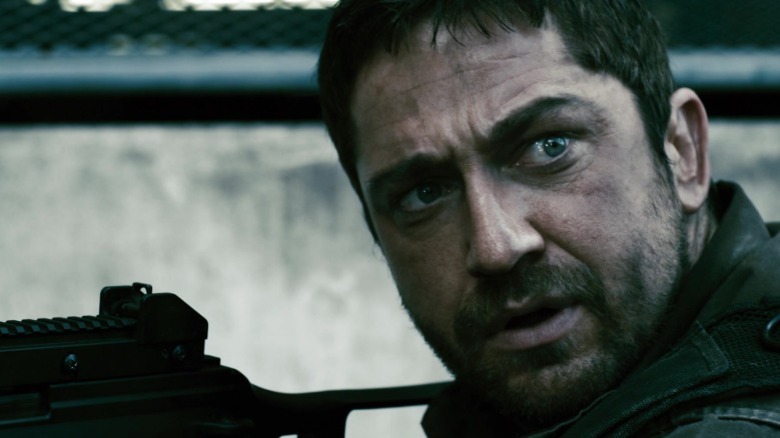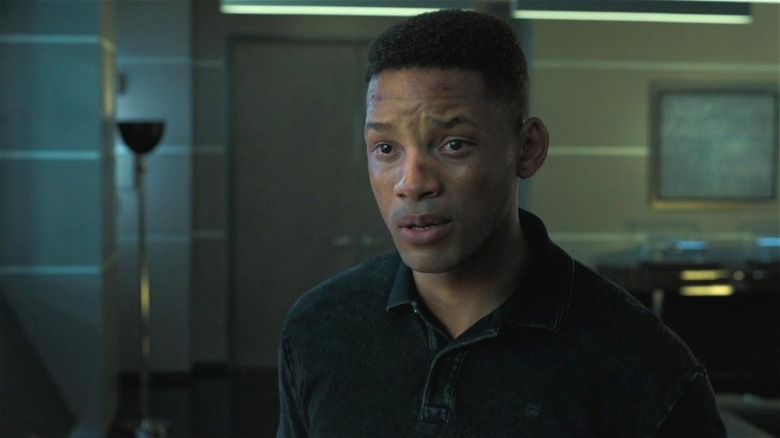Action Movies With Terrible Rotten Tomatoes Scores That Are Still Worth Watching
Not every action movie can be "Die Hard." For every acclaimed film like "Kill Bill" or "Mad Max: Fury Road," there's a dozen action movies that were shredded by critics.
In fairness, a lot of those films probably deserve their lousy Rotten Tomatoes scores. After all, making an action movie is no easy task, and you need more than a couple of explosions to create an awesome film. On the other hand, Rotten Tomatoes is a website that lacks nuance, and sometimes, you might find an adrenaline-laced gem under all those slimy green splotches. Sure, these critically-derided movies might not hold up to "Lethal Weapon" or "The Dark Knight," but despite their flaws, they're hiding fun performances, amazing set pieces, and thrilling stunts.
From films with monstrous snakes and unbelievable boxers to gigantic gods and witch-hunting heroes, these action movies might have terrible Rotten Tomatoes scores, but they're still worth watching.
Anaconda
Directed by Luis Llosa, "Anaconda" is a big, dumb monster flick that traffics in B-movie scares — and we mean that in the best possible way. Set in the Amazon jungle, this 1997 adventure follows a group of documentary filmmakers, led by Jennifer Lopez, who run into the world's biggest and hungriest snake. This creature yanks its victims underwater, snatches them out of the air, and never seems to get its fill of human flesh. And while it's occasionally done with silly CG, there's also a fantastic animatronic that looks like it escaped from an evil Rainforest Cafe.
But the serpent isn't even the highlight of the movie. The real draw is Jon Voight as a smarmy poacher with an untraceable accent. Voight leers and sneers every second he's on camera, all the while plotting ways to catch the killer reptile... even if that means using human bait. And if "crazy Jon Voight fights monster snake" isn't enough to impress you, then listen to Roger Ebert, who called "Anaconda" "a slick, scary, funny Creature Feature, beautifully photographed and splendidly acted in high adventure style."
Sure, most critics disagreed with Ebert, and that's why the film has a 40 percent on Rotten Tomatoes. But really, you should just ignore the cynical critics who panned Anaconda because they're just trying to squeeze all the fun out of cinema.
Rocky IV
"Rocky IV" feels like a movie that slipped into the "Rocky" series after escaping from a far crazier franchise. It's got a talking robot, a monster with superhuman strength, and montage after montage after montage. "Rocky IV" is basically a sci-fi music video, complete with lackluster plot, flag-waving jingoism, and recycled clips from the first three "Rocky" films.
As a result, it was left sprawling on the canvas with a 38 percent on Rotten Tomatoes. But honestly, if you're watching "Rocky IV" as a sports movie, you're doing it wrong. It's really a superhero movie, with Rocky as a punch-drunk Captain America, sticking up for his fallen friend. And then there's Ivan Drago (Dolph Lundgren), a supervillain hybrid of Frankenstein's monster, Rocky Horror, and the Terminator. And just like Schwarzenegger, Lundgren delivers great one-liners with robotic perfection ("I must break you," "If he dies, he dies"). The final confrontation is like Superman vs. Doomsday, an epic battle with titans taking shots that no mere mortal could survive. Lean into the over-the-top awesomeness, and suddenly you're watching modern-day mythology.
On top of its comic book nature, "Rocky IV" has some dramatic moments that work incredibly well. Carl Weathers is great here as Apollo Creed, an aging warrior who's struggling with his own mortality, and the epic '80s montages feature some cool moments, contrasting Rocky's primitive training methods against Drago's technically advanced robo-gym. And after the final boxing match, just like any superhero would, Rocky ends the Cold War and brings peace and harmony to the world. It might not compare to the original film or "Creed," but if you're looking for fun action schlock, "Rocky IV" is a knockout.
The Fast and the Furious: Tokyo Drift
Tokyo Drift is the red-headed stepchild of the "Fast and Furious" franchise. Paul Walker is nowhere to be found, Vin Diesel only shows up for a few seconds, and the undercover cops and international heists are replaced by a soapy teenage melodrama. Despite all its horsepower, "Tokyo Drift" couldn't outrace the critics, and the movie currently sits on Rotten Tomatoes with a measly 37 percent approval rating. But while it has its haters, "Tokyo Drift" also has its fair share of fans, including legendary film critic Roger Ebert. As YouTube critic Patrick D. Willems put it, it's "like a high school sports movie combined with a martial arts movie."
The plot follows a troubled American kid named Sean (Lucas Black) who moves to Japan, gets involved with the yakuza, and is forced to race the local bully to save his buddies, his girlfriend, and his own honor. Of course, before he can become the king of the road, this hotshot gaijin has to learn how to drift. In other words, it's "The Karate Kid" with cars, complete with training sequences and a climactic showdown, and watching these hot rods drift their way down mountain roads is pretty impressive — and even kind of beautiful. On top of all that, "Tokyo Drift" introduces some key players to the "Fast and Furious" franchise: director Justin Lin, writer Chris Morgan, and actor Sung Kang, who plays the incredibly cool and always hungry Han. These guys would be instrumental in shaping the series going forward, but even as its own movie, "Tokyo Drift" is a slick-looking film with fun race sequences and characters we care about.
King Arthur: Legend of the Sword
Guy Ritchie is best known for making comedic crime thrillers like "Snatch" and "Lock, Stock and Two Smoking Barrels," which would seem to make him a weird pick to direct "King Arthur: Legend of the Sword," a movie set during the Dark Ages. With an unwieldy screenplay hobbled together from multiple scripts, "King Arthur" bombed hard with audiences, while critics refused to pledge fealty to the once and future king, giving the movie a most unroyal 31 percent approval rating on Rotten Tomatoes.
Admittedly, there are parts of "King Arthur" that are a chore to sit through. The broken timeline hurts the story, and the plot gets overwhelming. But you can't deny this movie is ambitious, especially when the monsters roll onto the screen. The movie opens with war elephants that tower over castles, and then we watch as a mass of writhing tentacles reveal slimy witches that are part woman, part kraken. There are freakish wood nymphs, oversized snakes, and Arthur (Charlie Hunnam) does battle with packs of giant rats and humongous bats.
There are freaky sorcerers, medieval warriors who feel like MMA fighters, and even the Lady of the Lake makes a mystical appearance, grasping Excalibur as she floats through dark, black waters. But there's more going on here than just high fantasy. Guy Ritchie brings his trademark humor to the film, and almost every character acts like a cockney criminal. The dialogue is fast and quippy, and the banter feels like something out of "Snatch." The modern-day humor really adds to this ancient story, making "King Arthur: Legend of the Sword" a wonderfully weird way to spend a Saturday afternoon.
The Lone Ranger
Plagued by production woes and a whitewashing controversy, Disney's adaptation of "The Lone Ranger" was in trouble from day one, and things got even worse when the movie flopped hard at the box office. As for the critics, they shot this film to pieces, giving it a 30 percent on Rotten Tomatoes. And granted, "The Lone Ranger" is a mess; the screenplay is all over the place, but in a way, that's what makes it so fascinating.
There are so many ideas at play here, from the exploitation of Chinese laborers and the genocide of Native Americans to the takeover of American politics by corrupt corporations. Its framing device of an aged Tonto living in a carnival show works as a mournful dirge to the Old West, but at the same time, the movie pokes fun at the Lone Ranger concept made famous by radio programs and old TV shows. The cinematography by Bojan Bazelli is sweeping and beautiful, the movie borrows plot points and song cues from Westerns like "Once Upon a Time in the West" and "Little Big Man," and some of the sets feel like they were taken from a Baz Luhrmann movie.
"The Lone Ranger" is also incredibly imaginative. There's a cannibal outlaw who feasts on human hearts, a legion of flesh-hungry rabbits, and a mystical stuffed crow that's not quite dead. There's a prostitute with an ivory leg that doubles as a rifle, not to mention the mysterious spirit horse that can climb trees and appear on rooftops. And while the decision to cast Johnny Depp was a bad idea, culturally speaking, he's actually hilarious as the stoic-but-insane Tonto, and he has real chemistry with the charming Armie Hammer. While it's no "Pirates of the Caribbean," "The Lone Ranger" doesn't deserve its bad reputation and proves even the messiest movies have a silver lining.
Bright
Critics hated "Bright." In fact, they loathed it. And you know what? It's totally understandable. "Bright" has a lot of problems, from its lazy worldbuilding and sloppy screenplay to its awkward handling of racial issues. But while this fantasy thriller has a 26 percent approval rating on Rotten Tomatoes, over 11 million people watched it on its opening weekend alone. What was it about "Bright" that appealed to so many people?
Well, "Lord of the Rings" meets "Training Day" is a cool elevator pitch, and while "Bright" doesn't live up to its potential, it's filled with striking images, like a centaur cop and a dragon flying over Los Angeles. There are glowing skeletons and a gangster hideout filled with pagan antlers, and then there's the disturbing moment when our police heroes find an elf that's been morphed into the world's scariest piece of wall decor.
And while the story mechanics and character arcs are messy, David Ayer knows how to direct an action scene. The gas station shootout is a highlight, and the moment when Will Smith saves his orc partner from a gang of murderous cops is wonderfully done. Noomi Rapace is sexy and scary as an evil elf and does a lot with the little she's given, but the best thing about "Bright" has got to be Joel Edgerton, who plays Nick Jacoby, the first orc ever hired to work for the LAPD.
Jacoby faces a lot of resentment from his racist co-workers, and Edgerton wonderfully conveys the pain Jacoby is feeling, even though he's buried beneath all those prosthetics. (It also must be said, the orcs look incredible.) Edgerton plays Jacoby as earnest and eager, someone doing his best in a screwed-up world, and you should check out "Bright" for his performance alone.
Dracula Untold
Universal Studios has been trying to create a monstrous cinematic universe for quite some time. Before The Mummy completely unraveled, the studio was hoping to get "Dark Universe" going with "Dracula Untold." Unfortunately, lousy box office numbers and a 25 percent on Rotten Tomatoes forced the studio to stake this film in the heart. But while it's not a great movie by any stretch of the imagination, "Dracula Untold" is wonderfully dumb fun — basically a vampire movie meets a superhero flick.
Directed by Gary Shore, "Dracula Untold" finds Luke Evans as the titular bloodsucker. Only instead of trying to murder innocent women, this Dracula is an undead superhero, trying to protect his homeland from invading Turks. And this dark tale truly shines when Dracula is beating up bad guys: He plows into a platoon of goons like a mad NFL player, all while roaring like a lion, and using Force-like powers, he commands a legion of bats to batter his enemies. He even creates his own vampire army, resulting in a brilliantly bloody climax. This isn't high art by any stretch of the imagination, but if you've ever wondered what would happen if Dracula used his bat-powers for good, fortunately for you, that story has been told.
Death Sentence
Directed by James Wan, "Death Sentence" has the gore of "Saw," the scares of "The Conjuring," and the family feels of "Furious 7." In fact, we're legitimately shocked that it only has a 20 percent approval score on Rotten Tomatoes. Unlike most of the films on this list, there are no glaring flaws in Death Sentence, no obvious reasons why it was blasted so hard by the critics. Instead, this 2007 revenge thriller is gritty, gross, and utterly compelling.
With its opening montage of home video footage, we're rooting for Nick Hume (Kevin Bacon) from frame one. He's a good dad and a loving husband, so naturally, he's devastated when his oldest son is murdered by a machete-wielding gangster. When Nick realizes the legal system is going to let the killer off easy, he takes justice into his own hands. But what starts off as a simple act of revenge spirals into a full-on war when the criminal's brother comes back for blood.
Kevin Bacon is key to the movie's success. He's not some Charles Bronson-super vigilante. He's a real human being struggling with guilt and grief. He barely knows how to use a gun, and he breaks down into tears after murdering his son's killer. You really feel the love this guy has for his family... and his hatred for the thugs who've threatened his home. In addition to Bacon, there's John Goodman as an f-bomb-dropping force of nature who sells Nick his cache of weapons in the best "gun-buying" scene since "Taxi Driver." It all caps off with one of cinema's most underrated gunfights, an epic battle awash in red light. Thanks to Wan, Bacon, and screenwriter Ian Jeffers, "Death Sentence" is a badass, bloody affair that proves Rotten Tomatoes can sometimes get it wrong.
Gods of Egypt
Alex Proyas is a man with vision... a vision critics don't always appreciate. That's especially true for "Gods of Egypt" a movie that was lambasted for its Eurocentric cast, cheesy acting, and shabby CGI. But casting controversy aside, the film's over-the-top performances and bizarre look are actually what make it worth your while, even if it only has 15 percent on Rotten Tomatoes.
Set in ancient Egypt, the plot follows a human thief named Bek (Brenton Thwaites) who's caught in a struggle between two larger-than-life deities, the heroic Horus (Nikolaj Coster-Waldau) and the power-hungry Set (Gerard Butler). The two are battling to control Egypt, and this mythological conflict takes our characters into outer space before plunging them into the underworld. Along the way, they encounter a demonic worm made of teeth and darkness, a sandy Sphinx with a fondness for riddles, and serpent-tongued women who hunt their prey while riding giant cobras.
The movie is absolutely bonkers when it comes to the visuals. Gerard Butler flies around in a chariot pulled by scarabs. The gods bleed golden blood and morph into metallic monsters. On top of all that, "Gods of Egypt" is a drama of Shakespearean proportions, where royal relatives stab each other in the back and a prince has his eyeballs ripped from his skull.
But the movie always stays lighthearted and fun, and while this was never going to win any Oscars, "Gods of Egypt" gets you to care about Bek and Horus as they save their loved ones from Butler's delightfully hammy acting. Despite the big performances, the movie plays everything perfectly straight. There's no cynical winking, no annoying irony, and if you enjoy big-hearted adventures like "Thor" or "Willow," then "Gods of Egypt" might be good for your soul. Plus, Chadwick Boseman shows up, and he always makes everything better.
Hansel and Gretel: Witch Hunters
It's easy to see why "Hansel and Gretel: Witch Hunters" has 15 percent on Rotten Tomatoes. It's mostly because of Hansel and Gretel. Other than realizing that not all witches are evil, they don't have character arcs, their dialogue is flat, and there's nothing distinguishing them from each other besides the fact that one is played by Jeremy Renner and the other by Gemma Arterton. Really, they're just two badasses who run around and blow up witches.
Of course, if you're into seeing evil creatures getting their heads cut off, then "Hansel and Gretel: Witch Hunters" is the movie for you. This 2013 horror adventure is like "Evil Dead" on crack, complete with anachronistic weapons, buckets of blood, and more wicked old hags than you can shake a broomstick at. The monster makeup here is on point, especially at the end when an international coven of witches shows up for a bit of child sacrifice. There's an animatronic troll reminiscent of something from "The Dark Crystal," and the flying effects are both creepy and cool.
And while Renner and Arterton aren't doing a lot with their characters, Famke Janssen more than makes up for it as the villainous head witch. She's big, she's bad, she's over-the-top glorious. And Peter Stormare is here too, bringing his smarmiest Stormare out for everyone to hate. Granted, watching Jeremy Renner punch women in the face is a bit unsettling, but for the most part, the kills here are creative, with living trees ripping men in half and witches getting blasted with magical bullets. If you're in the mood for a movie that's lost its mind, this witchy flop is for you.
Domino
Released in 2005, "Domino" tells the story of Domino Harvey (Keira Knightley), a real-life woman with an exceedingly peculiar story. The daughter of prolific English actor Laurence Harvey, she ditched a budding career as a fashion model to become a bounty hunter. The film tells a fictionalized story in which Domino, after being arrested by the FBI, recounts her story to a criminal psychologist (Lucy Liu) and explains the events that led to her involvement in a $10 million robbery two days earlier. Through Domino's account, we get to know her milieu and her colleagues, and it soon emerges that not everything in the robbery case is as it seems.
A product of the once-in-a-lifetime partnership between director Tony Scott and screenwriter Richard Kelly, both masters of appealing excess, "Domino" is an incredibly cool and stylish movie that throws itself so wholeheartedly into a jerky, ostentatiously gritty 2000s action aesthetic as to become a mesmerizing exercise in pure commitment. Scott's go-for-broke filming and editing choices have seldom been more energetic or emotionally engaging, and, in addition to the framing two-hander between Knightley and Liu, the supporting cast is just astonishing: Mickey Rourke, Christopher Walken, Mo'Nique, Édgar Ramírez, Delroy Lindo, Mena Suvari, Macy Gray, Jacqueline Bisset, Dale Dickey, and Tom Waits all show up. Yet critics at the time largely castigated "Domino" for its over-the-top nature, like that was a bad thing — its score of 18% is among the lowest of Keira Knightley's career.
Deep Impact
"Deep Impact" is a 1998 disaster movie directed by Mimi Leder, and like many disaster films of the time, it's an ensemble effort with a multipolar narrative. Initially, it unfolds from the perspective of Jenny Lerner (Téa Leoni), an American political journalist who, while pursuing a seemingly unrelated story, ends up learning about an asteroid on course to hit the Earth. Days later, the U.S. government officially discloses to the public the existence of a comet that threatens to destroy all human life within a year, and an ongoing collaboration with the Russian government to send a space mission to the comet's surface and alter its path with atomic bombs. "Deep Impact" then follows the subsequent months of preparation for the comet's arrival, as scientists, astronauts, politicians, journalists, and common citizens scramble to both cope with and avert humanity's possible extinction.
1998 had one of those summers with multiple mainstream movies about similar themes within similar genres, and "Deep Impact" now largely exists under the shadow of "Armageddon," that year's highest-grossing film. Both movies had middling critical reception, with "Deep Impact" sitting at 45% on Rotten Tomatoes — but, in retrospect, it definitely deserved a better critical shake. Not only is it a sturdy, well-directed, scientifically grounded blockbuster, but its focus on the human scale of the disaster feels genuinely refreshing by today's mushy green-screened standards. While Leder offers up plenty of massive, haunting spectacle, she never lets us forget or overlook the people whose existence is at stake in the first place.
Miami Vice
An adaptation of the eponymous 1980s NBC series, "Miami Vice" is a 2006 cop actioner about two Miami-Dade police officers who work as undercover agents infiltrating and helping defuse criminal operations. During a particularly complex and high-stakes case that sees Ricardo Tubbs (Jamie Foxx) and Sonny Crockett (Colin Farrell) go undercover even deeper than usual, the two detectives find themselves increasingly personally involved, and the lines between their personal and professional identities begin to blur in hectic, dangerous ways.
"Miami Vice" was the ninth feature film from director Michael Mann, who also wrote and produced it. And, like "Collateral," the Mann film immediately preceding it, "Miami Vice" was not just a sturdy action flick but a radical formal experiment in which the always daring genre filmmaker pushed the then-nascent digital format to new extremes. "Miami Vice" went even further in its visual boldness, however, throwing itself so wholeheartedly into the dense, grainy, sensorially overwhelming aesthetic of digital video that many — among both critics and regular audiences — were weirded out by at the time. The film has a meager 47% critics score on Rotten Tomatoes, with many of them calling its plot and characters uninteresting and convoluted. Over time, however, "Miami Vice" gained a richly deserved cult following, and many now appreciate what a bold, energetic, entertaining slice of high-octane genre cinema it is, convoluted plot or not — to say nothing of how formally visionary and singular it feels even nearly two decades later. There has yet to be a film that tackles digital like it did.
Push
Everyone talks about the fact that Chris Evans has played two different Marvel superheroes — both Johnny Storm, a.k.a. the Human Torch, and Steve Rogers, a.k.a. Captain America — but what isn't mentioned as often is that Evans has a third superhero movie leading role in his resumé. In 2009, Evans played Nick Gant, a man with telekinetic powers, in the original superhero action thriller "Push," written by David Bourla and directed by Paul McGuigan.
Essentially a superhero indie film, the movie, budgeted at $38 million (far less than the first "Iron Man," released one year prior), is set in a world populated by humans with varying psychic abilities. After a U.S. government agency known as the Division develops a power-enhancing drug and kills numerous test subjects with it, telepath Kira Hudson (Camila Belle), the only survivor of the tests, escapes the Division with a dose of the drug, triggering an international manhunt. It's then that clairvoyant teen Cassie Holmes (Dakota Fanning) seeks out Nick, who's lying low in Hong Kong, and persuades him to help her find Kira.
Fun, solid, moody, and original, "Push" has more energy and world-building creativity than a lot of more "respectable" later entries in the superhero genre. It didn't impress critics in 2009 — Rotten Tomatoes has it at 23% — but it's very much a worthwhile watch, if only as a fascinating glimpse of a different style of superpowered team-up action.
Batman v Superman: Dawn of Justice
The DC Extended Universe was still only a burgeoning concept when Zack Snyder's "Batman v Superman: Dawn of Justice" rolled around in 2016. At the time, the single film in DC Comics' answer to the Marvel Cinematic Universe had been 2013's "Man of Steel," bit "Dawn of Justice" got things moving for the DCEU by introducing not just Batman (Ben Affleck) and Lex Luthor (Jesse Eisenberg) but also Wonder Woman (Gal Gadot) — for the first time ever in a live-action theatrical film, no less. The film's plot, as scripted by Chris Terrio and David S. Goyer, follows the aftermath of "Man of Steel," with the world divided between gratitude and fear towards Superman (Henry Cavill) — which, aided by some manipulation on Luthor's part, ultimately goads Bruce Wayne into action against the Kryptonian in a bitter, messy, angry conflict, until a common threat to them and to the world emerges.
To be sure, "Dawn of Justice" is a very flawed film, and it's not hard to understand its reputation among critics (to the tune of a 29% on Rotten Tomatoes) and fans; it is, after all, a dour, grim, relentlessly dark blockbuster with a shockingly short supply of heroism. It also features Jesse Eisenberg in one of the most bizarre villain performances (for good or for ill) in superhero movie history. Even so, the film is fascinating as a thorny cultural object, imbued with genuine creativity, and is surprisingly engaging to watch despite its various problems and contradictions.
Speed Racer
It took more than a decade of erratic development for a Hollywood "Speed Racer" film adaptation to hit multiplex screens, but it finally happened in 2008, when the Wachowski sisters put forth their vision of the iconic Tatsuo Yoshida anime.
The Wachowskis' "Speed Racer" follows the titular 18-year-old auto racer (Emile Hirsch) as he follows in the footsteps of his late older brother, Rex (Scott Porter). He becomes a sensation in the racing world, supported by his parents (John Goodman and Susan Sarandon), younger brother (Paulie Litt), best friend Sparky (Kick Gurry), and girlfriend Trixie (Christina Ricci). Although Speed is offered a contract by E. P. Arnold Royalton (Roger Allam) of the mighty Royalton Industries, he ultimately makes the decision to stick with his own family's independent racing team, Racer Motors, setting the stage for a classic little guy vs. big guy showdown that unfolds through various high-octane races.
"Speed Racer" was a massive financial flop in 2008; adding insult to injury, it was harshly criticized by reviewers for being supposedly lacking in strong storytelling and too reliant on CGI imagery, resulting in a 41% Tomatometer score. Nowadays, however, "Speed Racer" is seen by many critics and fans as a straight-up visionary film — a masterpiece of extreme, expressive, unbridled form, in which the Wachowskis attempted to carve out a new, more colorful and kinetic film language within the confines of the contemporary Hollywood action blockbuster. Even 17 years on, there's still no other movie that looks, moves, or feels like it.
Blackhat
One of the first American films to serve as a non-franchise mainstream starring vehicle for Chris Hemsworth, "Blackhat" is a 2015 hacker-themed thriller directed by Michael Mann from an original screenplay by Morgan Davis Foehl. Hemsworth portrays Nicholas Hathaway, a skilled hacker serving prison time for hacking banks, who is offered a commute to his sentence provided that he's able to help the U.S. and China governments locate the hacker responsible for national security-threatening breaches in both countries. Hathaway thus joins a globetrotting team that includes FBI Special Agent Carol Barrett (Viola Davis), Chinese PLA cyberwarfare Captain Chen Dawai (Leehom Wang), and Dawai's engineer sister Lien (Tang Wei).
"Blackhat" was not generally well received by critics; its score of 33% on Rotten Tomatoes is reflective of the fact that many reviewers deemed it disjointed, silly, and poorly written. But, like many Michael Mann films, it did have its share of passionate defenders (even at the time, showing up on several critics' year-end lists in 2015). And, truthfully, if you know where the movie's pleasures lie going in, chances are you may also have an incredible time with it. "Blackhat" is not primarily interested in being a cerebral, airtight thriller; it is first and foremost an exercise in exuberant visual style, which sees Mann turn the sleek, shadowy, unassailable mood of the digitized contemporary world into a sumptuous spectacle of light and shadow, while making plenty of stealthily fascinating observations on the balance of societal power in the information age.
Assassin's Creed
Directed by Justin Kurzel in what was then thought of as a peculiar choice for his follow-up to "Macbeth," 2016's "Assassin's Creed" reunites the two stars of that 2015 Shakespeare adaptation — Michael Fassbender and Marion Cotillard — for an adaptation in a very different cultural register. Scripted by Michael Lesslie, Adam Cooper, and Bill Collage, the film brings to the screen the mythology of the eponymous Ubisoft video game franchise, albeit by telling a brand new story.
As in the games, the movie's world is embroiled in a secret conflict between two ancient orders, the powerful and status-quo-maintaining Templar Order and the subversives of the Assassin Brotherhood. Kurzel's "Assassin's Creed" follows Cal Lynch (Fassbender), a modern-day descendant of the Brotherhood, as he gets captured by the Abstergo Foundation (a front for the Templars) and placed into a machine that connects him to the memories of 15th-century Spanish assassin Aguilar de Nerha.
For a widely maligned video game movie — the game's fans are not especially fond of what Kurzel and the writers did with the lore, and, given the 19% Tomatometer, it's safe to say critics weren't much more sympathetic — "Assassin's Creed" is actually surprisingly sturdy and watchable and knows how to have fun with its own loopy, time-bending premise. Plus, Kurzel nails the thing that's really important in an "Assassin's Creed" movie: the stunts, which are largely elaborate, punchy, and well-shot, featuring plenty of the sprightly parkour through olden-day architecture that became the franchise's signature.
Venom
Directed by Ruben Fleischer of "Zombieland" fame, 2018's "Venom" stars Tom Hardy as both Eddie Brock, an American investigative reporter who gets more than he bargained for when he breaks into the labs of bio-engineering corporation Life Foundation, and the voice of Venom, the alien symbiote that bonds with Eddie's body and forms an uneasy but sometimes mutually productive relationship with him. Despite their differences, Eddie and Venom must work together as inhabitants of the same body to protect the Earth in the face of a planetary-scale symbiote invasion and put a stop to the plans of Life Foundation CEO Carlton Drake (Riz Ahmed).
Interestingly, even though Sony's Spider-Man Universe non-starters "Morbius," "Madame Web," and "Kraven the Hunter" are reputed to have flopped primarily due to being bad, "Venom" had a critical reception in a not-too-distant ballpark: 30% on Rotten Tomatoes. And even then, it was a massive global success at the box office. In a way, "Venom's" trilogy- and franchise-launching popularity is a testament to the fact that, if you meet it at its fundamentally goofy level, it's just an enormously fun movie. It's one of the few superhero comedies to strike the right tone between not taking itself seriously at all and still managing to have plenty of giddy, unmitigated fun with its own premise and characters. And, quite frankly, Tom Hardy just might give the most committed, mesmerizing, entertaining, and — dare we say — outright best leading performance in modern superhero movie history.
Valerian and the City of a Thousand Planets
It's all too rare nowadays that we get to experience true, all-out, bona fide space operas at the movies, but we got one in 2017 with "Valerian and the City of a Thousand Planets." Adapted from the classic French comic book series "Valérian and Laureline," written by Pierre Christin with illustrations by Jean-Claude Mézières, "Valerian" had a budget in the hundreds of millions, put together entirely through non-Hollywood funding — which technically marks it down as the most expensive indie film in history.
The movie, which was scripted and directed by Luc Besson, takes place in the 28th century, in a universe where the International Space Station has been moved to deep space and refitted over the centuries into a massive city known as Alpha, home to inhabitants of over 3000 species. Valerian (Dane DeHaan) and Laureline (Cara Delevingne), officers at the United Human Federation police, are given the mission to retrieve the universe's last specimen of an animal species capable of converting pearls from the planet Mül into energy.
"Valerian and the City of a Thousand Planets" was a box office flop, and didn't fare too well with reviewers, scoring 47% on Rotten Tomatoes. Critics in 2017 admonished it for being too corny, messy, and over-the-top. As it happens, however, "Valerian" is in fact an exuberant sci-fi blockbuster adventure, easily one of the most entertaining and imaginative we've had in years, featuring oodles of propulsive action, dense world-building, and fearlessly weird visual splendor.
Æon Flux
Ostensibly adapted from Peter Chung's groundbreaking MTV animated series of the same name, 2005's "Æon Flux" deviates significantly from the show's mythology and plot but keeps the basics: Four centuries after 99% of humanity was wiped out by a deadly virus, the surviving populace lives together in a walled city-state known as Bregna, ruled over by a technocratic council of scientists. Æon Flux (Charlize Theron), a skilled member of a rebel organization known as the Monicans, carries out missions to undermine the Bregnan authority — until one particular mission leads her to question her own orders and delve deeper into the city's shadowy workings.
It's very clear in watching the finished product that "Æon Flux" was hacked to bits and then chaotically reassembled by Paramount Pictures; critics noticed it and gave it a 10% on Rotten Tomatoes, and even director Karyn Kusama has since disowned the film and said it does not reflect her original vision. But the reason "Æon Flux" went on the chopping block in the first place is that Paramount executives deemed it a financially intractable $50 million art film, and that artistic passion also comes through, even in the film's existing, compromised form. Janky editing and resulting hectic storytelling aside, Kusama is just too exceptional and creative a filmmaker for "Æon Flux" not to be worth watching; her dystopian sci-fi vision, rendered through lush Y2K-esque images and brutalist designs and enormously original action sequences, is never less than exciting and often outright astonishing to watch unfold. Here's hoping we one day get a director's cut.
Jupiter Ascending
If space operas are rare in today's cinema, original space operas are even rarer, so thank the movie gods the Wachowskis are able to keep convincing Hollywood studios to pour enormous amounts of money into wild, high-risk ideas. In what may well have been the riskiest gamble of their careers, the sci-fi visionaries created an all-new story in which Russian-born Chicagoan housekeeper Jupiter Jones (Mila Kunis) stumbles upon the knowledge that she's got galactic royal blood and gets whisked off to a space adventure by half-canine soldier Caine Wise (Channing Tatum) as forces sent by the quarreling members of a powerful interplanetary dynasty attempt to capture her.
Although "Jupiter Ascending" didn't win over audiences (it grossed $184 million worldwide against a budget at least that big) or critics (it has 28% on Rotten Tomatoes), with many accusing it of being too goofy and silly to take seriously, its real sin was not being based on any pre-existing, preemptively nostalgic, or respectable property — it's really no goofier than "Star Wars" or "Dune" or any film in the MCU. What's more, these being the Wachowskis, the 2015 movie is invested with genuine passion — in every vista and every action set piece, you can sense the Wachowskis' excitement in getting to bring the aesthetics of pulp sci-fi magazines to cinematic life — and an actual sense of thematic purpose, with Jupiter as a heroine who prevails not through meathead heroics but through integrity and compassion. It's genuinely singular stuff.
Warcraft
Duncan Jones' "Warcraft" loosely adapts the eponymous game franchise, including its most celebrated title, the immensely popular 2004 MMORPG "World of Warcraft." Written by Jones in collaboration with Charles Leavitt, the film jumps right into the games' sprawling high fantasy world. Right at the start, we watch the orc citizens of Draenor, a world being destroyed by fel magic, mount an assault on the human realm of Azeroth via interdimensional portal, led by the merciless warlock Gul'dan (Daniel Wu). A war thus breaks out between the orcs and the humans of Azeroth, and the human effort, spearheaded by Anduin Lothar (Travis Fimmel), is ultimately joined by a band of orc dissidents led by noble chieftain Durotan (Toby Kebbell) after he realizes Gul'dan is the one responsible for tearing Draenor apart.
As you can see, that's a lot of rarefied lore to get through — a lot more than even the most genre-devoted fantasy films usually allow themselves. But therein lies the fun: Despite deviations from the games' mythology, "Warcraft" was clearly made by people who love high fantasy unabashedly and aren't afraid to dive deep into it. Many weren't on board, of course, and, despite a decent worldwide box office haul courtesy of Chinese audiences, "Warcraft" flopped in the U.S. and was harshly received by critics in 2016, scoring a 29% on Rotten Tomatoes. But for viewers who appreciate a big, ambitious, visually spectacular action fantasy epic that doesn't stop to explain or justify its own mythology, there is plenty to love here.
In Time
"In Time" is a 2011 original sci-fi film infused with true auteurist passion, from back when such movies were still viable in Hollywood. Written, directed, and produced by Andrew Niccol (the writer of "The Truman Show" and director of films like "Gattaca" and "Lord of War"), it's got a high-concept hook that puts most high-concept hooks to shame: In a future Earth where humans are genetically engineered to stop aging at 25 and embedded with a timer that kills them instantly upon reaching zero, their remaining time is used as a universal currency.
One day, poor factory worker Will Salas (Justin Timberlake) is unwittingly given an enormous amount of time by suicidal rich centenarian Henry Hamilton (Matt Bomer). After failing to use that time to save his mother, Rachel (Olivia Wilde), from dying, Will sets out on a revenge quest against the wealthy time-hoarders of New Greenwich while being pursued by Raymond Leon (Cillian Murphy), a policeman, a.k.a. Timekeeper, who suspects him of killing Henry.
Critics accused "In Time" of being heavy-handed, giving it a 36% on Rotten Tomatoes. In truth, the film's class metaphor, explored through a Bonnie-and-Clyde-esque revolutionary romance between Will and renegade rich girl Sylvia Weis (Amanda Seyfried), is blunt and unsubtle, but that doesn't make it any less effective. An expert in mining sci-fi high concepts for all they're worth, Niccol commits to a thoroughly fun, sleek, and atmospheric exploration of the film's dynamic premise, aided by lush lensing from Roger Deakins and a cast of game performers.
Resident Evil: Retribution
Released in 2012, "Resident Evil: Retribution" is the fifth film in the "Resident Evil" series. It continues the previous films' loose adaptation of the eponymous Japanese game franchise and, like entries 1 and 4, is written and directed by Paul W. S. Anderson. This time around, the plot is essentially an opportunity to revisit and reflect on the franchise's cumulative history; as a zombie plague continues to ravage the earth, Alice (Milla Jovovich) wakes up in an underwater Umbrella Corporation facility that specializes in generating clones and rendering outbreak simulations at various locations around the world. She, of course, must fight to wrest herself from captivity and escape the facility.
Like every "Resident Evil" film, "Afterlife" was widely derided by critics, landing a 28% on Rotten Tomatoes along with the typical accusations of being shallow, empty, and too interested in mindless spectacle. Among Paul W. S. Anderson's fans, however, it is held in very high regard to this day, and there's good reason for that. For the kind of movie he's fond of making, Anderson is kind of a genius — few people in Hollywood are as interested in playing with the textures and the plasticity of hyperslick CGI-assisted action sequences to the extent that he is, and "Retribution" is his arguable magnum opus, a bold, endlessly imaginative exercise in refracting and remixing franchise lore. Every "Resident Evil" movie is worth watching if you're a fan of form-first action cinema, but "Retribution" is just a victory lap of coolness.
Sucker Punch
We usually talk about Zack Snyder in the context of his contributions — or lack thereof — to blockbuster series, both established and original, but on at least one occasion, Snyder offered up a wholly original, one-off fantasy vision with no pretension towards franchising. We're referring, naturally, to "Sucker Punch," starring Emily Browning as Babydoll, a young woman who's committed to a mental institution by her abusive stepfather (Gerard Plunkett) after he murders her mother. As the stepfather and the orderly (Oscar Isaac) plot to have Babydoll lobotomized, she begins to perceive the institution as an elaborate, metamorphous fantasy world and joins forces with other imprisoned girls to plot an escape.
Upon its release in 2011, "Sucker Punch" was met with outright hostility by most critics, with a 22% on Rotten Tomatoes to show for it. Its negative reputation is not altogether incomprehensible, given that it's an undisciplined parade of fanciful action set pieces that find Snyder indulging his most Snyderian impulses as a stylist. Even so, it's also his most interesting and creatively outreaching movie; there's a lot to admire in the overt space it makes for surreality and fantastical escape as driving forces. Although it was heavily criticized in 2011 for supposedly playing into the male gaze by objectifying its would-be feminist heroines, the years since have seen the emergence of a cult following of female and queer fans who find resonance in the film's pitch-black view of the horrors of the patriarchy. If nothing else, it's very much a movie worth watching for yourself.
Hancock
Peter Berg's "Hancock" is an offbeat 2008 superhero dramedy starring Will Smith as a reckless, alcoholic superhero. A deconstruction-slash-reconstruction of the genre with a barbed script by Vy Vincent Ngo and "Breaking Bad's" Vince Gilligan, the movie depicts John Hancock (Smith) as a bitter, irresponsible loner whose heroic acts always create as much trouble and calamity as they solve. This, coupled with Hancock's utter disinterest in changing his ways, renders him an object of constant derision and ridicule by the public — until idealistic PR manager Ray Embrey (Jason Bateman) strikes up a partnership with Hancock to help him improve his image.
Even as it became a rousing box office success, "Hancock" was shunned by critics, scoring a mere 42% on Rotten Tomatoes. Many took issue with the film's midpoint shift away from scrappy comedy into more conventional superhero-adventure territory, but it's safe to say that "Hancock" was severely underestimated for the playfulness and originality it brought to the genre; even if it ultimately settles into a more familiar groove, it's still a very entertaining groove, with Smith, Bateman, and Charlize Theron all in top form. Plus, if it was already pretty fun in 2008, "Hancock" now feels positively fresh in light of the increasing sameyness of the comic book movie wave it predated. Marvel, DC, and other hulking cinematic institutions have dabbled in comedy in the 16 intervening years, but there have been very few superhero films as genuinely irreverent as "Hancock."
Tank Girl
One of the most notorious cult films of the '90s, Rachel Talalay's "Tank Girl" is a 1995 screen adaptation of the eponymous British comic book series. The story takes place in the year 2033 in a post-apocalyptic Australia, ten years after a comet strike caused an Earth-wide drought. All water is now controlled by the Water & Power (W&P) corporation, headed by de-facto despot Kesslee (Malcolm McDowell). A commune in the Australian desert is home to the last independent water well, and one of that commune's members is the intrepid Rebecca Buck, a.k.a. Tank Girl (Lori Petty). One day, Kesslee's forces attack the commune and take Tank Girl captive — but she soon escapes alongside fellow prisoner Jet Girl (Naomi Watts), and the two embark on an epic crusade against W&P aboard a stolen war tank.
A defining tome in the history of punk cinema, "Tank Girl" endured heavy studio meddling and was maligned by critics and audiences upon its original release, scoring 45% on Rotten Tomatoes and flopping massively at the box office. Since then, however, it has been rightfully reappraised by many as a misunderstood masterpiece — a film in which Talalay set out to reconfigure what Hollywood action cinema was capable of delivering. Everything about it is utterly unconventional, willfully abrasive, and enormously fun, right down to its uncompromising feminist spin on action cinema archetypes. It's one of the boldest and most original studio movies of the last 30 years.
Gamer
In keeping with the modus operandi of Mark Neveldine and Brian Taylor, "Gamer" is a 2009 sci-fi action film with a very out-there premise. In the film's version of the year 2034, ruthless computer programmer and entrepreneur Ken Castle (Michael C. Hall) has invented a brain nanite technology that allows humans to control and see through the eyes of other humans as though they're characters in a video game. Following the success of a virtual community simulator called "Society," Castle launches "Slayers," a third-person shooter in which players control volunteer death row inmates in real-life death matches. The film follows John Tillman a.k.a. Kable (Gerard Butler), the most popular "Slayers" avatar, who is close to completing the 30-match survival streak that may earn him his freedom — until sabotage and political intrigue set in.
If you can get past — or better yet, get on board with — its borderline-numbing level of over-the-top violence, "Gamer" is a very unique and engaging slice of original sci-fi, despite what its 30% Rotten Tomatoes score might suggest. Neveldine and Taylor are skillful pop stylists, and they manage to make a fireworks show out of the film's various shifts in agency and perspective, with Peter Amundson and Fernando Villena supplying some of the most inventive editing in any Hollywood movie this century. In its sheer, tasteless excess, "Gamer" even gets at some kind of deep-seated truth about the hysterical absurdity and moral alienation of the post-digital world.
Gemini Man
In the last four decades of film history, there have been few directorial careers as varied, ambitious, and impressive as Ang Lee's. After helping revitalize Taiwanese cinema throughout the '90s and then proving himself a visionary Hollywood studio helmer with instant classics like "Sense and Sensibility," "The Ice Storm," and "Brokeback Mountain," Lee embarked on an effort to push the very boundaries of what was possible to do in movies. First, with 2012's "Life of Pi," he ushered in a new era for 3D and for visual effects more broadly; then, he made it his mission to explore the untapped possibilities of high-framerate filmmaking.
In the second of the two films he shot in 4K at 120 frames per second, 2019's "Gemini Man," Lee gave himself the extra challenge of making that technology work in the context of a frantic, effects-heavy action thriller. The film, which stars Will Smith as a retiring assassin who begins to be pursued by a younger clone of himself, was not well-received, as reflected in its 27% Rotten Tomatoes score. But while most critics conceded that the film was interesting as a bold experiment from a tireless master, "Gemini Man" actually works much better and yields much more enthralling results than it was given credit for. It's a sincere, impassioned, emotionally resonant movie that actively interrogates the jingoistic machismo of standard action cinema while twisting and poking around its standard formal devices with profound curiosity. There's just nobody else doing like Ang.
